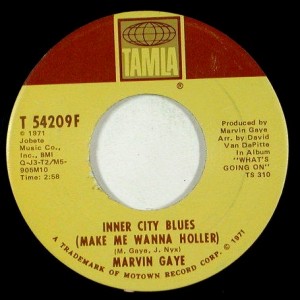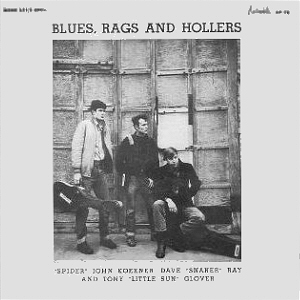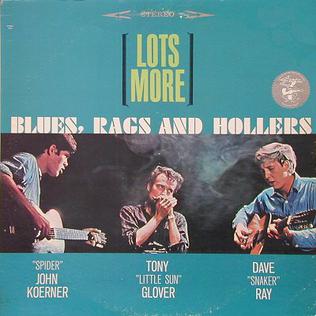Related Research Articles
Blues is a music genre and musical form which was originated in the Deep South of the United States around the 1860s by African-Americans from roots in African-American work songs and spirituals. Blues incorporated spirituals, work songs, field hollers, shouts, chants, and rhymed simple narrative ballads. The blues form, ubiquitous in jazz, rhythm and blues and rock and roll, is characterized by the call-and-response pattern, the blues scale and specific chord progressions, of which the twelve-bar blues is the most common. Blue notes, usually thirds, fifths or sevenths flattened in pitch are also an essential part of the sound. Blues shuffles or walking bass reinforce the trance-like rhythm and form a repetitive effect known as the groove.
The music of the United States reflects the country's pluri-ethnic population through a diverse array of styles. It is a mixture of music influenced by the music of the United Kingdom, West Africa, Ireland, Latin America, and mainland Europe, among other places. The country's most internationally renowned genres are jazz, blues, country, bluegrass, rock, rock and roll, R&B, pop, hip hop, soul, funk, gospel, disco, house, techno, ragtime, doo-wop, folk music, americana, boogaloo, tejano, reggaeton, surf, and salsa. American music is heard around the world. Since the beginning of the 20th century, some forms of American popular music have gained a near global audience.
Spirituals is a genre of music that is "purely and solely the creation" of generations of African Americans, which merged African cultural heritage with the experiences of being held in bondage in slavery, at first during the transatlantic slave trade—the largest and one of the most inhumane forced migrations in recorded human history, and for centuries afterwards, through the domestic slave trade. Spirituals encompass the "sing songs," work songs, and plantation songs that evolved into the blues and gospel songs in church. In the nineteenth century, the word "spirituals" referred to all these subcategories of folk songs. While they were often rooted in biblical stories, they also described the extreme hardships endured by African Americans who were enslaved from the 17th century until the 1860s, the emancipation altering mainly the nature of slavery for many. Many new derivative music genres emerged from the spirituals songcraft.

Yodeling is a form of singing which involves repeated and rapid changes of pitch between the low-pitch chest register and the high-pitch head register or falsetto. The English word yodel is derived from the German word jodeln, meaning "to utter the syllable jo". This vocal technique is used in many cultures worldwide.
A work song is a piece of music closely connected to a form of work, either sung while conducting a task or a song linked to a task which might be a connected narrative, description, or protest song.

African-American music is an umbrella term covering a diverse range of music and musical genres largely developed by African Americans. Their origins are in musical forms that arose out of the historical condition of slavery that characterized the lives of African Americans prior to the American Civil War. Some of the most popular music types today, such as rock and roll, rock, funk, jazz, blues, rhythm, and rhythm and blues are African-American music.

Saunders Teddell, or Saunders Terrell, known as Sonny Terry, was an American Piedmont blues and folk musician, who was known for his energetic blues harmonica style, which frequently included vocal whoops and hollers and occasionally imitations of trains and fox hunts.
"Gypsy Eyes" or "Gipsy Eyes" is a song written by Jimi Hendrix and performed by the Jimi Hendrix Experience for the 1968 album Electric Ladyland. Subsequently, it was released as the B-side of the "Crosstown Traffic" single, which reached number 52 on the US Billboard Hot 100 and number 37 on the UK Official Singles Chart.

"Inner City Blues ", often shortened to "Inner City Blues", is a song by Marvin Gaye, released as the third and final single from and the climactic song of his 1971 landmark album, What's Going On. Written by Gaye and James Nyx Jr., the song depicts the ghettos and bleak economic situations of inner-city America, and the emotional effects these have on inhabitants.
Little is known about the exact origin of the music now known as the blues. No specific year can be cited as the origin of the blues, largely because the style evolved over a long period and existed in approaching its modern form before the term blues was introduced and before the style was thoroughly documented. Ethnomusicologist Gerhard Kubik traces the roots of many of the elements that were to develop into the blues back to the African continent, the "cradle of the blues". One important early mention of something closely resembling the blues comes from 1901, when an archaeologist in Mississippi described the songs of black workers which had lyrical themes and technical elements in common with the blues.

Marvin Gaye Live! is the second live album issued by soul musician Marvin Gaye, released on June 19, 1974, by Tamla Records.

The field holler or field call is mostly a historical type of vocal music sung by field slaves in the United States to accompany their tasked work, to communicate usefully, or to vent feelings. It differs from the collective work song in that it was sung solo, though early observers noted that a holler, or ‘cry’, might be echoed by other workers. Though commonly associated with cotton cultivation, the field holler was also sung by levee workers, and field hands in rice and sugar plantations. Field hollers are also known as corn-field hollers, water calls, and whoops. An early description is from 1853 and the first recordings are from the 1930s. The holler is closely related to the call and response of work songs and arhoolies. The Afro-American music form ultimately influenced strands of African American music, such as the blues, rhythm and blues and negro spirituals.
Holler may refer to:

Blues, Rags and Hollers is the first album by the American country blues trio Koerner, Ray & Glover, released in 1963.

Lots More Blues, Rags and Hollers is an album by the blues trio Koerner, Ray & Glover, released in 1964.
African blues is a genre of popular music, primarily from West Africa. The term may also reference a putative journey undertaken by traditional African music from its homeland to the United States and back. Some scholars and ethnomusicologists have speculated that the origins of the blues can be traced to the musical traditions of Africa, as retained by African-Americans during and after slavery. Even though the blues is a key component of American popular music, its rural, African-American origins are largely undocumented, and its stylistic links with African instrumental traditions are somewhat tenuous. One musical influence that can be traced back to African sources is that of the plantation work songs with their call-and-response format, and more especially the relatively free-form field hollers of the later sharecroppers, which seem to have been directly responsible for the characteristic vocal style of the blues.
"The World Is Rated X" is a socially conscious song recorded by Marvin Gaye culled from sessions of the shelved You're the Man project from 1972, later issued on the Motown compilation album, Motown Remembers Marvin Gaye: Never Before Released Masters and released as a promotional single in 1986.

Gluggo is an album by the Spencer Davis Group, originally released in 1973 on Vertigo Records.
Preaching chords are blues/gospel-inspired chords played on a Hammond organ or piano, and many times with a drum set as well, near the end of a pastor or minister's sermon to accentuate, emphasize, and respond to them in a musical way. Like the related tradition of sermonic "whooping", these chords are most often used in the Black Church and Pentecostal traditions.
References
- ↑ Alexander, Leslie. M. Rucker, Walter, Jr. eds. Encyclopedia of African American History. ABC-CLIO (2010). ISBN 9781851097746. page 196.